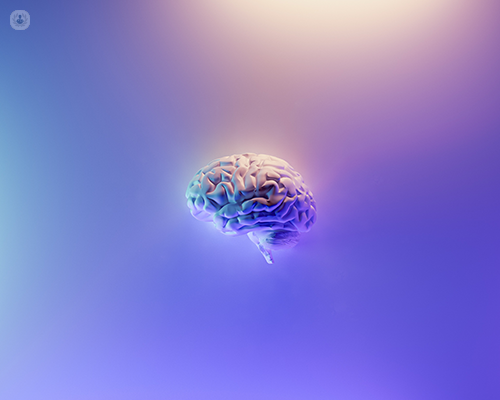Epilepsy (Part 1): Seizures and Diagnosis
Written by:Epilepsy is a chronic neurological disorder, characterised by the onset of recurrent seizures (abnormal electrical activity in the brain), that affects 50 million people of all ages worldwide.
Dr Katia Cikurel is a renowned consultant neurologist with more than 30 years of experience. In the first of a two-part series on epilepsy, Dr Cikurel offers a comprehensive insight into the different types of epileptic seizures, the effect of epileptic seizures on the brain, and the basis for an epilepsy diagnosis.

What are the different types of epileptic seizures?
The majority of seizures can be classified as either focal or generalised, depending on where in the brain the abnormal electrical activity is arising and on what occurs during the seizure.
Focal aware seizures (also known as an aura or simple partial seizures) can arise from a very localised area of the brain and might not spread further before terminating. This type of seizure lasts between seconds to a few minutes, with awareness being fully retained.
Symptoms are generally dependent on where the abnormal electrical activity is arising. However, during a focal aware seizure, a person might:
- jerk their limbs or their face (due to the frontal lobe - motor cortex of the brain)
- experience speech arrest (due to the frontal lobe - speech area of the brain)
- have strong recurrent déjà vu or a strong rising sensation from the stomach into the chest (due to the temporal lobe of the brain)
- notice coloured visual shapes (due to the occipital lobe of the brain)
- experience marching sensory abnormality (due to the parietal area of the brain)
If the abnormal electrical activity spreads, especially within the temporal lobe, there may be loss of awareness without complete loss of consciousness. This type of seizure is called a focal impaired awareness seizure (also known as a complex partial seizure).
During a focal impaired awareness seizure, a person might:
- look vacant or stare ahead
- smack or chew their lips
- pluck at clothes or objects
- wander around aimlessly
- repeat a single word
- experience speech arrest without awareness
If a focal seizure spreads across the whole brain, then it is called a focal to bilateral tonic-clonic seizure. This type of seizure might either start with one of the clinical manifestations outlined above (for example, jerking of one arm or staring ahead) and progress with loss of consciousness, initial stiffness of the body, and then jerking.
There are also seizures which arise from the whole brain without a specific focus, called primary generalised epilepsies. These more commonly start in childhood up to early adulthood. There are a number of types, but going straight into a generalised tonic-clonic seizure is the most common.
Following a focal impaired awareness seizure or a generalised tonic-clonic seizure, a person may continue to be confused or may not be fully aware, even if they seem to be interacting more appropriately. They will often not remember anything that happened until a while later - from a few minutes to (sometimes) hours afterwards.
What are the effects of epileptic seizures on the brain? Is memory and language affected?
In most cases, the effects of an epileptic seizure on the brain are temporary.
While epileptic seizures can cause loss of function, symptoms (such as jerking or sensory abnormality) or loss of function (such as speech arrest) usually settle following the seizure, and the person returns to normal functioning.
Often, there is a period of amnesia (or memory loss) of the events that occurred during the seizure which can last for a variable period afterwards - usually less than an hour - and there may be a variable period of confusion. Despite this, memory function is generally not affected by having had a seizure.
Speech and language may be affected during certain seizures, but these will return to normal after recovery.
What is the basis for an epilepsy diagnosis?
A diagnosis of “epilepsy” is made if a person has two or more epileptic seizures. Generally, the diagnosis of a seizure will be made based on a description of what happened. The process will usually require an additional description from a witness, as the person who has had the seizure often cannot provide an accurate description. This is because the person will often have an altered awareness of the event, or will have been unconscious during the event itself.
The doctor will want to hear about everything that happened, including any symptoms that occurred before the seizure began.
The doctor will then need to have a description of all the events as they unfolded, including:
- how long the seizure lasted
- whether one side of the body was more affected than the other
- whether the person was aware at all or could talk
- how long the person took to return to normal after the seizure
It is often helpful to video the person having the seizure to show the doctor later - as long as the videographer makes sure that the person who has the seizure is safe and will not injure themselves if they are left unattended.
In some cases, the diagnosis can be helped by carrying out further investigations, such as an MRI scan. Despite this, these investigations are often negative or normal despite a definite seizure having occurred. This is because only very few brain cells need to fire off at the wrong time for a seizure to occur - and these brain cells may look normal on an MRI scan. The abnormal firing may also only happen very infrequently, meaning that in between times, the electrical recording of the brain cell firing picked up by an EEG (electroencephalogram) may be normal.
If an MRI scan does show a brain lesion that would be keeping in with the seizures, then this can also help with the diagnosis and management of focal onset seizures (which arise from a scar in the temporal lobe of the brain).
If an EEG shows either generalised or focal spikes, then this can help to determine the type of seizure present, the type of medication prescribed for it, and its on-going management.
However, even if an MRI scan and an EEG are normal, a diagnosis of an epileptic seizure (or epilepsy, if more than one episode has occurred) will still be made if a good description of a seizure is provided.
Head on over to the second part of this series on epilepsy to find out if there are any medical concerns for women who are diagnosed and how epilepsy is commonly treated.
If you have been experiencing epileptic seizures, do not hesitate to reach out to Dr Katia Cikurel to discuss your case and receive advice and treatment from an expert.


